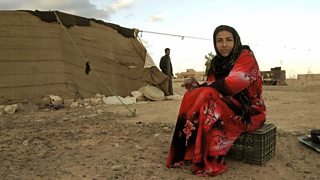Global broadcasters in partnership ask 'WHY POVERTY?'
Nick Fraser
Commissioning Editor, Storyville
Tagged with:

Rafea in the village with her husband Alian in the background
Think about the best thing that could happen to you as a producer,��film-maker or television executive. Winning an Oscar? Shaking hands��with Robert Redford? Hearing films with which you've been involved��called works of genius? Wrong. The best is , the most ambitious attempt to date to��ask why, in the 21st Century, a billion people still live in poverty.
WHY POVERTY? now involves dozens of people throughout the world - broadcasters, people helping out with the press and well wishers, but��it began four years ago as the work of three people – Mette Hoffmann Meyer, the��Head of Documentaries at Danish Broadcaster DR, Don Edkins who has run the operation��from Cape Town, and myself. We've worked together from beginning to��end. Much of what we have done has been unpaid, out of reasonable��hours. We've burnt carbon, we've cajoled, we asked for more favours��than we can recall. There were slammed doors, but many opened ones.
It has been more than worth it. We have huge pride in the remarkable��eight documentary films that make up the season. At the launch at the ,��when 500-odd people filled a vast conference hall, a panel from all over the world chaired by Fergal��Keane discussed the films for close to two hours. These films weren't��just TV shows, the subjects they covered were of life and death��importance. They did matter, terrifically so.
The work has been gruelling, and we've often fought our way from one��crisis to another, but the boldness of our film-makers and the��ambition of the project has made all that effort meaningful. Most of��all I have to thank my co-labourers for sustaining their own��commitment - and making sure mine didn't flag.��
WHY POVERTY? isn't a brand or a trademark. It's a simple idea. On or��around November 25th, over 500 million viewers served by some 72 participating��broadcasters, will watch these films about such subjects as the way in which��women are held back from economic development, and what happens when��they break loose; what it meant to be poor in the Neolithic Age;��whether Bono and Geldof did indeed ; how poor,��young Chinese are screwed by their education system; and how��multinationals in Africa find ways of not paying taxes.
They are well-crafted, perceptive documentary films. And they will have a life��after broadcast. They will be used for educational purposes. They will��exist in different lengths for wildly different audiences – as��downloads on mobile phones, in village screenings in Africa,��classrooms in the UK, and university seminars in the US.
So how did WHY POVERTY? happen – and how did the �������� find our place at��the heart of so ambitious a project? Go back a decade and you find a��group of broadcasters clubbing together to make films about AIDS in��Southern Africa. The films were shown throughout stricken countries,��and in richer countries too.
And now go to 2007, and the showing of 40-odd��broadcasters showed ten films about the paradoxes of global democracy.��We hear that the films are screened at the UN by Ban Ki Moon. FUTURA,��a Brazilian educational network sends them to over 1,000 villages in��specially created 'democracy suitcases.' And the most popular film,��, which depicts the vote-buying that goes on when��Chinese nine year olds elect their class prefect, becomes a bootleg hit in��non-democratic China.
WHY POVERTY? has taken close to four years. We have worked closely with��colleagues (among others too numerous to name) at The Open University,��Dutch broadcaster VPRO, ITVS in the USA, SVT Sweden, NHK Japan and ZDF in Germany.��In Copenhagen, , was created to provide the broadcast partners��with a way to work together and commission the films.
BAFTA-winning filmmaker Brian Hill talks about his new documentary Four Born Every Second which looks at child birth and infant mortality around the world.
The eight broadcast films are made for and funded by broadcasters. (the first - 'Four Born Every Minute' - is the subject of the audio slideshow above).��There's a website () and thirty shorts, which will be��used on the internet, and for educational purposes. It's been more��than a roller-coaster ride.��Two weeks ago we signed a contract with Turkish broadcasting,��and we're about to conclude a deal in India. The films will be shown��in Moldova – Moldova? Yes, I kid you not – Indonesia, Palestine��and Israel. The only two countries in which the films will not be��shown are Russia and China. However, we talked��to a Chinese broadcaster, who said there was a chance that they could��be shown. Maybe not the Chinese film, which was too controversial, but��the others… well, who knows?
Now that it's nearly finished we can say that it's been among the��wildest experiences of our professional lives. WHY POVERTY? upsets our��preconceptions about 'the poor.' WHY POVERTY? tells us that��the lives of poor people are eventful, engrossing, sometimes heroic.��They are, like the rest of us, only poorer. Somehow we have to see��poor people as individuals. We have to do this without losing��sight of the fact that poverty is something real, afflicting the��planet.
There's no magic bullet when it comes to abolishing poverty. The��concept of aid from rich to poor is coming to seem dated. No single��'solution' indeed exists, and a new generation of experts are telling��us we must look at many factors in combination – better government,��fairer trade policies, clever initiatives designed to enhance the��potential of individuals. We can end poverty if we wish. This is what��WHY POVERTY? has to say. You don't have to be poor to get this simple,��important message. Maybe WHY POVERTY? will help spread it around the��world.
Nick Fraser is the Chairman of Steps International and Editor of .��
The films will broadcast on �������� One from Monday 19th November and on �������� Four from Sunday 25th November.
For more information on the programmes visit the . An audio slideshow about the first documentary in the series is available via the Media Centre website.
